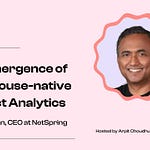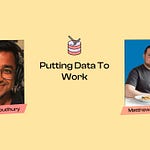There's so much great content about building data infrastructure and adopting modern data technologies — this show too has been focused on this aspect of data.
But once companies have the infra, the data, and everything in between, they have to start measuring the return on available data or ROAD.
So how can companies go about measuring and increasing ROAD?
Ruben Ugarte, a decision-making expert who has helped companies of all sizes increase their return on data, has some answers.
Let’s dive in:
Q. What is return on available data (ROAD) and why should companies care about measuring it?
The big focus for a long time has been how to collect more and more data, which is effectively a solved problem — even the smallest companies can collect millions of data points relatively easily, and data collection will continue to get even easier.
Data teams and companies, therefore, need to focus their efforts on deriving more insights from their data. And that's not a question of volume — it's really a measure of quality.
When we talk about return on available data, it's essentially the ROI on money, talent, and time spent on data efforts.
It's a simple calculation that sales, marketing, and other parts of the business go through; data needs to go through a similar process to understand if it’s profitable or if it’s just not worth the current investment.
Q. Besides infrastructure and tools, what else do companies need to measure and increase the ROAD?
Primarily, a better process for understanding the impact of data.
There's a spectrum when it comes to using data. On one end, there are companies that have data because every company has data but they're simply not using it — no one knows what data is available and how to access it.
On the other end, there are companies with sophisticated tools and mature data teams that are very good at using data. However, even within that spectrum, if you ask executives, "What is the value of all this data? How much money are you getting back from everything you're putting in?" Often, there’s no clear answer.
Having clarity on how a company makes decisions and where data plays what role has been very helpful. After all, the whole point of having data is to make better decisions.
All the reports, and dashboards, and tools, and infrastructure — all of it must help a team or an individual make better decisions and improve the outcome of their efforts.
A company I work with was all over the place when it came to decision-making — sometimes they used data, sometimes they did not, sometimes the connection between the report and the action they took was clear, but often, it wasn't. So, they couldn't say, "Well, you know, clearly, data is significant for us."
Therefore, to measure the impact of data, there has to be a concrete and consistent decision-making process.
Q. Is there a connection between a company's data culture and its return on available data?
Oh yes! I think there are levels to this connection.
The first level is very technology-driven. So many companies I’ve spoken to are very, very focused on technology — they want the best technology, which is fine, but it can also become a bit of an obsession.
"Is this really the best technology? Should we replace this with that?"
Eventually, companies realize, "Well, we have good technology so let's now focus on making sure everyone has data."
This is the second level where terms like data empowerment, data enablement, and data democratization come into play.
Companies begin to realize that they need good technology, but they need even better processes to get data into the hands of people.
In the third level, once there’s a good data culture in place, companies need to invest in training and education for teams to understand and use available data in their day-to-day, as well as to convert those efforts into something tangible for the business.
Q. We’ve established that technology is not enough, but how important is the role of a data warehouse here? Is having one non-negotiable?
No, I don’t think a data warehouse is mandatory — it’s a useful tool but I also know companies, especially if they're not as technical or sophisticated, that might benefit more from other kinds of tools.
I've always seen two types of approaches to dashboarding:
Centralize everything into a data warehouse: Companies focus on bringing their entire universe of data into one place, and the warehouse powers data visualization.
Use purpose-built tools but never centralize the data: This approach works for companies with fewer technical resources where they might have a really good product analytics tool, and a really good marketing attribution tool, both of which are then connected directly to a dashboarding tool.
Therefore, a data warehouse is helpful but it's not the only way to build a data culture and increase the return on data.
Q. You work with a wide range of companies — what do you generally see done well at companies with a high return on available data?
Three things:
First, having a flexible mindset and understanding that in some cases, data will help, and in other cases, it will not.
It sounds very obvious, but people get stuck and say, "Now that we have all this data, everything has to be data-driven — if you have an opinion that's not backed by data, don't even bring it up." Clearly, there's grace to this, it's not black or white.Second, having a really good decision-making process.
This goes back to one of the original points of having decision playbooks, being very bold about how the company makes decisions, and constantly improving those.
Third, having a data culture.
Working towards building that culture, building the proficiency of people inside the company with data, and having the right technology of course, but really putting it all together to empower people to use the available data.
Q. Is there a specific role early-stage companies need to hire for to increase their return on data?
I always thought that a data analyst should really fit this role. However, I’ve found at many companies that analysts become too focused on the data — on creating reports and dashboards instead of focusing on the value to the business.
However, some companies have done a good job accidentally and sometimes on purpose by hiring someone who is technical enough to understand data — they might not even be an engineer, let alone a data engineer, but they understand statistics, and probability, and are generally much better at the business side of things.
This is the person saying, "We have all this data, this is what it means for the business, this is why it's worth it, and this is the ROI we’d get if we go down this path."
In theory, this person is a data analyst but in practice, the role has all kinds of names. I’ve seen people in operations and even executives who do this really well.
The kind of person I would look for is someone who is completely obsessed with how data can help the business and is able to cut all the other noise.
Q. Last question — what's your one piece of advice for companies that have a lot of data and are looking to increase their ROAD?
Companies need to become obsessed with insights.
They need to bring the same level of focus and obsession they’ve had with technology for such a long time — the obsession that has resulted in these amazing data stacks with all kinds of things like Reverse ETL, and warehouses, and this, and that. It's incredible!
Companies must divert this energy and obsession with technology toward insights.
Only then can they start asking questions like:
How many insights are we generating every week?
How do we generate more insights?
What's the quality of the insights?
These questions ought to move companies closer to being data-driven, which is really the goal here at the end of the day.
So that’s my number one advice to companies — just become more obsessed with generating insights from data.
You can also tune in on Spotify or Apple Podcasts.
Prefer watching the interview?
If you’re a data practitioner who wants to become obsessed with how data can help the business, has some tips for you:













Share this post